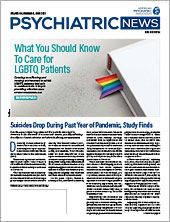This month’s column focuses on the concept of ecological grief with particular emphasis on the impacts on children and future generations. Ashlee Cunsolo, Ph.D., is a preeminent researcher on these issues and their impacts on Indigenous peoples throughout the world, especially eastern Canada and Australia. As clinicians and policy leaders, we must consider the authors’ recommendations for us to address the grief and anxiety younger generations are and will be experiencing.
—David Pollack, M.D.
Climate change is a growing threat to mental health globally, both exacerbating already-present mental health challenges and creating new stressors. Increasing evidence indicates that climate change can impact mental wellness directly, indirectly, or vicariously, leading to complex and often-overlapping clinical and nonclinical issues, including increased behavioral and mood disorders, depression and anxiety, suicide ideation and suicide, substance usage, psychiatric hospitalizations, family stress and violence, posttraumatic stress disorder, sleep disorders, and strong emotional reactions.
Ecological grief—the grief experienced due to endured or anticipated ecological losses, the disruption of environmental knowledge, and the loss of place-based identity due to environmental changes—and the related ecological anxiety that emerges due to climate change and resulting impacts to peoples and places are two such terms that are increasing in both academic and popular usage. While ecological grief and anxiety are widespread, children and young people are uniquely vulnerable to these emotions and experiences. For example, children interviewed for a recent Rolling Stone article described feeling overwhelmed by the burden of climate change, expressing feelings of anxiety about their future and the future of their potential children. In a survey by the American Psychological Association in December 2019, 47% of young people aged 18 to 34 indicated that the stress they experience due to climate change affects their daily lives. Similarly, a 2019 poll conducted by the Washington Post/Kaiser Family Foundation in the United States found that 57% of teenagers aged 13 to 17 years old indicated that climate change made them feel scared, and 52% said it made them angry. In the same survey, 68% of young people aged 18 to 29 reported feeling afraid, and 66% indicated they felt helpless.
These are stark and sobering numbers.
Climate change is impacting children and young people during critical stages of physical and psychological development. For example, after climate-related natural disasters (for example, wildfires, flooding, and hurricanes), children and young people demonstrate a higher prevalence and severity of psychological distress and emotional struggles than adults. Additionally, displacement of families or communities due to these natural disasters often exacerbates existing financial hardships, disrupts social support networks, and displaces attachment bonds that play an important role in fostering children and young people’s well-being, leading to negative mental health outcomes. In addition to these direct experiences, children and young people may also be more susceptible to outcomes from indirect stressors as they experience increasing stress, anxiety, and grief from anticipating future changes and/or from watching others experience suffering related to climate change—for example, the destruction, displacement, and loss of life felt vicariously through recent wildfires in Australia or in anticipation of major storms, hurricanes, and flooding events.
There is limited understanding, however, of exactly how the medium- and long-term direct and indirect stresses and anxieties from climate change will affect children and young people’s psychosocial development, behaviors and mood regulation, sleep patterns, and overall mental health and resilience as adults.
Characterizing the experience of ecological grief and anxiety among children and young people, as well as exposing the need for resources to help children and young people cope, is what motivated two of the authors of this article (Breanne Aylward, M.Sc., and Madison Cooper, B.A.) to pursue graduate work on this topic. While the paths that led us to study ecological grief in children and young people differ, we were both troubled by what we were seeing and hearing on this topic in the media, research, and in our own lives. We were witnessing an increasingly widespread use of terminologies, such as ecological anxiety and ecological grief, to describe the intense feelings of children and youth, and we resonated with that. Within our provinces in Canada (Alberta and Ontario, respectively), we are noticing both acute and chronic evidence of climate change—including natural disasters such as wildfires, glacier melt, long-term increases in temperature that prevent lakes from freezing over as they did only a number of years ago—all of which, when combined with what we know about climate change globally, comes with negative mental and emotional consequences for us both. Indeed, our personal experiences have helped us empathize with those who are suffering, anxious, and/or grieving due to climate change and both inform and motivate our research.
While research has already identified children and young people as vulnerable to climate change, climate-specific strategies to support them in effectively engaging, adapting, and coping in positive and healthy manners are limited. To better inform these strategies, we need the following:
•
An increase in research focusing on the specific mental health outcomes of climate change on children and young people.
•
Children and young people engaged in developing and adapting school curriculum at all levels about climate change, including space to discuss emotional reactions, such as ecological grief and anxiety.
•
Training for educators on how to responsibly teach age-appropriate information about climate change, respond to students’ mental and emotional reactions to the climate change curriculum, and support positive mental health coping strategies.
•
More mental health professionals who are trained to treat children and young people experiencing climate-related stress.
•
The inclusion of children’s and young people’s voices and priorities in mental health policies and programs related to climate change.
Ecological grief and anxiety are natural and healthy responses to ecological and climate-change-related losses. It is important to legitimize the process of mourning these losses by naming ecological grief and anxiety and supporting children and young people in coping with this grief and anxiety. Beyond helping children and young people cope, we believe that the above strategies could encourage them to engage in climate-related activities that effect change, promote their future health and well-being, and help them thrive and flourish. ■
The American Psychological Association survey is posted
here.
The Rolling Stone article, “Children of the Climate Crisis,” is posted
here.
The Washington Post/Kaiser Family Foundation poll is reported in the article posted
here.

